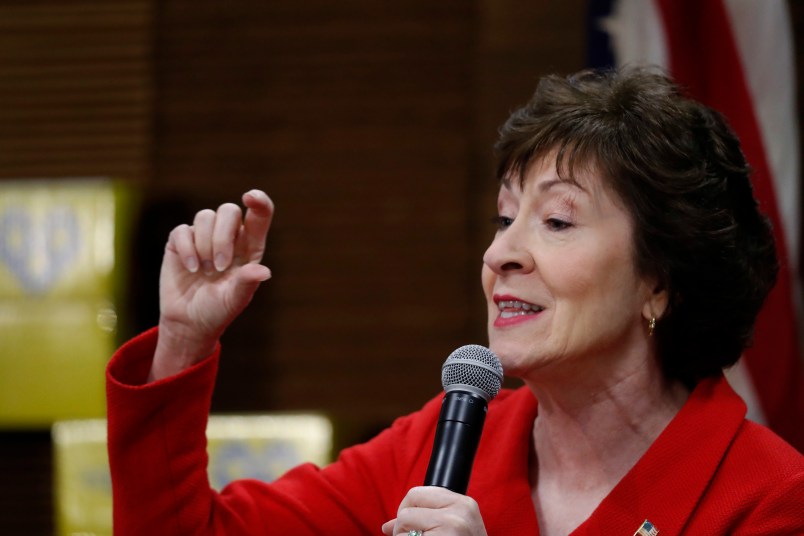Sen. Susan Collins (R-ME) walked out of a lunch meeting Tuesday with President Trump and Senate Republicans with a broad smile on her face, telling reporters that promises from the president to support two separate health care bills left her “encouraged” and more amenable to voting to repeal Obamacare’s individual mandate—something just weeks ago she warned would devastate the middle class.
Despite Trump’s purported backing, however, it is far from certain that either one could pass both chambers of Congress. And even if they did, several independent experts have said that both these bills combined would not protect the individual health insurance market by the harm caused by repealing the mandate.
“One of the major concerns I had was the impact on premiums of repealing the individual mandate,” she said Tuesday, referring to government estimates that repealing the mandate would raise insurance premiums by at least 10 percent as healthier consumers leave the market.
Collins insisted Tuesday that she secured support from Trump for two bills she says would mitigate the damage of repealing the mandate—one to restore government subsidies to insurance companies that Trump defunded earlier this year and the other to set up a federal reinsurance program.
“Collins-Nelson would provide seed money for states and authorize high-risk pools. That really helps insurers because it gives them much more certainty about what their claims are going to be like,” she told TPM in a gaggle with reporters Tuesday afternoon. “Similarly, Alexander-Murray would reinstate the cost-sharing reductions and that helps low-income people with their co-pays, and it gives certainty to insurers so they don’t flee the market. So I think the combination of those two would be very powerful.”
Health policy experts are not so sure.
“The Alexander-Murray bill—while good policy on its own—would come nowhere close to undoing the damage from individual mandate repeal. The same is true of the Collins-Nelson proposal,” writes Aviva Aron-Dine, a senior fellow at the Center on Budget and Policy Priorities and a former senior counselor at the Department of Health and Human Services.
Aron-Dine says the reinsurance funding in the Collins-Nelson bill, about $2.25 billion per year for just two years, falls far short of the $10 billion per year in permanent funding needed to prevent premiums from rising. She added that repealing the mandate is also likely to be the final straw that pushes insurers to flee the market entirely.
“An underfunded, temporary reinsurance program that states can decide whether and how to implement will not reverse the uncertainty and confusion about the overall status of the individual market risk pool resulting from mandate repeal,” she said. “As a result, it will not meaningfully reduce the risk that insurers will leave the market.”
Sen. Patty Murray (D-WA), the author of the Alexander-Murray bill, noted that her legislation addresses a completely different problem than the one created by repealing the mandate.
“Tacking Alexander-Murray onto the partisan Republican tax reform effort is like trying to put out a fire with penicillin. It will not do anything to help,” she said.
The Kaiser Family Foundation’s Larry Levitt has a similar assessment, writing that even if premiums are kept stable by Collins’ two mitigating bills, the ranks of the uninsured would still increase dramatically, and some insurers are sure to exit the market.
Reinsurance can be used to offset premium hikes resulting from repeal of the individual mandate. It would do little to stem the increase in the number of people uninsured.
— Larry Levitt (@larry_levitt) November 28, 2017
The individual mandate was designed with multiple policy goals in mind: personal responsibility, a stable insurance pool, and more people insured. Reinsurance helps with stability, but not the other two.
— Larry Levitt (@larry_levitt) November 28, 2017
Though Collins said earlier this month that she would need these bills passed into law before voting on the Senate tax and mandate repeal bill, she moved the goalpost on Tuesday.
“I’m pushing to make sure they are passed and signed into law prior to the conference report coming back,” she said, “So I would know for certain that we’re going to be able to mitigate the impact of repealing the individual mandate.”
When reporters pointed out the possibility that there will be no conference committee, that the House just passes the bill as-is, Collins waved away that fear. “Everything I’m hearing is that there is going to be a conference committee,” she said.







I can never figure out if Senator Collins is clueless, evil, or just plain stupid. My bet is that it’s a combo platter…
Water is Wet.
Still doesn’t change the fact that the GOP tax plan fucks over the middle and working classes to benefit the wealthy.
“Promised GOP Fix”
Can anyone name a time a Rethugliklan fixed anything? (By “fix,” of course, I mean improve or make better.)
While the GOP (lead by Trump) works to cleave more people from their health care - here is what PresidentPettyGrievance is toilet tweeting this am: http://www.bbc.com/news/world-us-canada-42166663 (bigoted anti Muslim videos from the far right in the UK)